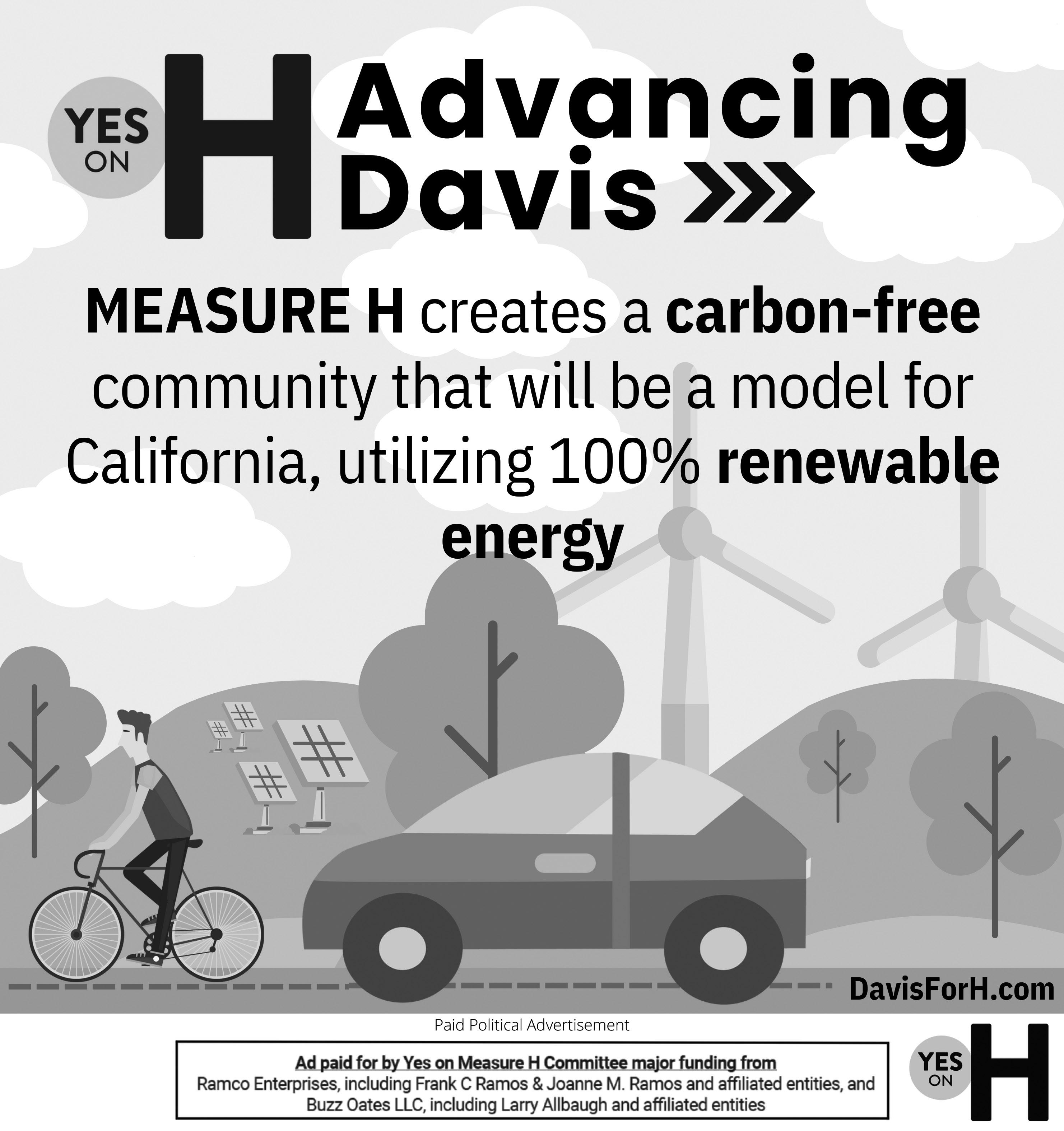
6 minute read
Hue made from limonite
Certified Audit of Circulations
The Davis Enterprise is published Wednesdays, Fridays and Sundays by The Davis Enterprise Inc., 315 G Street, Davis, CA 95616. Application to Mail at Periodicals Postage Prices is Pending at Davis, CA.
POSTMASTER: Send address changes to to The Davis
Enterprise, P.O. Box 1470,
Davis, CA 95617-1470.
Phone 530-756-0800 ———— R. Burt McNaughton Publisher Taylor Buley Co-Publisher Sebastian Oñate Editor Nancy Hannell Advertising Director Shawn Collins Production Manager Bob Franks Home Delivery Manager
SUBSCRIPTION RATES
FOR CARRIER DELIVERY
(plus tax) Home delivery............. $3.69 per week Online......................... $3.23 per week 12 weeks ................................ $44.84 24 weeks ............................... $89.30 48 weeks .............................. $159.79
MAILING ADDRESS Please send correspondence to The Davis Enterprise P.O. Box 1470
Davis, CA 95617-1470 HOME DELIVERY
If you do not receive your Enterprise by 5 p.m. on Wednesdays or Fridays or 7 a.m. on Sundays, please call 530-756-0826. Missed issues will be delivered on the next publishing day. HOW TO REACH US PHONE, MAIL OR IN PERSON
Home delivery: 315 G St., 530-756-0826
Delivery phone hours:
Mon.-Fri. 9 a.m.-1 p.m.; Sun. 7-10 a.m. Business office: 315 G St. 530-756-0800 Hours: Mon.-Fri. 9 a.m.-4 p.m.
FAX
Advertising . . . . . . . . . 530-756-7504 Home Delivery (Circulation). 756-7504 News . . . . . . . . . . . . . . . . .756-1668 EMAIL
News . . . . . newsroom@davisenterprise.net Sports . . . . . . . sports@davisenterprise.net Home Delivery circulation@davisenterprise.net Classifieds . . classads@davisenterprise.net Advertising . . . . . . ads@davisenterprise.net Legal Notices . . legals@davisenterprise.net Obituaries . . . . . . obit@davisenterprise.net Production . . graphics@davisenterprise.net ON THE WEB
www.davisenterprise.com
Copyright 2022 I realize many of you may have already voted even as we speak, but this election is so darn interesting that I can't help writing about it right up until the final vote is counted on Election Night.
But wait, according to the State of California Official Voter Information Guide that was signed, sealed and personally delivered by Secretary of State Shirley Weber, there are different rules on voting depending on which county you live in.
Yes, despite the fact this is a statewide election that also includes some national races, in some California counties you can vote in person early and in others you can't.
That seems odd to me. I understand that voting requirements and/or restrictions vary from state to state, but I've never heard of them varying within a state.
So much for equal protection under the law.
California has 58 counties, but in only 27 of them can you cast an in-person vote before Election Day. "More Days, More Ways to Vote with the California Voter's Choice Act," screamed the top of Page 5 headline in the Voter Guide. "Vote in person up to 10 days prior to Election Day," it continued with a list of lucky counties that decided to go this route. "Living in a Voter's Choice Act (VCA) county means more options when it comes to voting."
Among those options are voting by mail, using a drop box up to 28 days before the election, voting in person up to 10 days before the election, and registering to vote and voting on the same day.
Since every registered voter in California automatically receives a ballot before every election, regardless of county, some of those options are available to all Californians.
The big difference is the ability of people in those 27 counties to vote in person up to 10 days prior to Election Day. For some, that's a big deal. For those poor souls in the other 31 counties, it's no deal at all.
Again, so much for equal protection.
But here's the interesting part. The overwhelming majority of the 23 California counties that Donald Trump carried in 2020 have refused to allow their citizens to vote in person up to 10 days before Election Day.
And conversely, the overwhelming majority of the 35 California counties that Joe Biden carried in 2020 decided to indeed allow their citizens to vote in person up to 10 days before Election Day.
You think this was a non-political decision in all those counties?
The early in-person voting counties are clustered together in the northern Sacramento Valley, the Bay Area and the Southern California coast, plus Riverside County.
The no early in-person voting counties are nestled together in the San Joaquin Valley and all counties north of Butte County all the way to the Oregon border.
Take a look at the map on Page 5 of the Voter Guide and see for yourself. It's common sense that all citizens of California should have the exact same rights and privileges and conveniences when it comes to voting, no matter in which county they live.
Our politicians seem to think otherwise. — Reach Bob Dunning at bdunning@davisenterprise.net.
Study: Campus food pantry use linked to improved health
By CaleB Hampton Enterprise staff writer
Access to on-campus food pantries is making a difference for college students in California, according to a study conducted by researchers at four University of California campuses, including UC Davis, and the University of Arizona, Tucson.
The study, which was published this week in the Journal of Nutrition Education and Behavior, suggests that emergency food access on college campuses is associated with selfreported improvements in student health outcomes, including decreased depressive symptoms, better sleep and improved perceived health.
The study was authored by Suzanna Martinez of UCSF, Gwen Chodur of UC Davis, Erin Esaryk of UCSF, Sevan Kaladijian of UC Irvine, Lorrene Ritchie of UC Berkeley and Michael Grandner of the University of Arizona, Tucson.
“Until more long-term solutions that improve student nutrition are developed, food pantries may be filling a gap,” the authors wrote.
The study was based on responses from 1,855 students across the 10-campus UC system who completed an online survey in summer 2019. Students who completed the survey reported the number of campus food pantry visits they made in a typical week or month and retrospectively rated their perceived health, depressive symptoms and sleep sufficiency before and after having access to a food pantry.
“For 60% of students struggling with food insecurity, the pantry may have provided some emotional relief. Therefore, they may have experienced fewer depressive symptoms such as stress, anxiety, hopelessness, and feeling overwhelmed,” the authors wrote. “For other students, pantries may have provided a way to supplement their diet, particularly when living on a limited budget.”
According to prior research, nearly half of UC students who visited campus food pantries did so to prevent themselves from running out of food, while 37% used the pantries to supplement their dietary needs and 22% used the pantries because they had run out of food and lacked transportation to buy more.
Food insecurity is widespread on college campuses across the country. Since the Great Recession of 2008, as much as 44% of students enrolled in higher education in the U.S. have experienced food insecurity, a rate more than four times that of the general population.
According to a separate study that also surveyed students across the UC system, students who were food insecure had poorer self-perceived health, higher body mass index, slept worse and exercised less. Studies have also linked food insecurity with adverse academic outcomes.
The UC system has made targeted efforts to address food insecurity in its student population over the past several years. In 2014, the UC President's Global Food Initiative funded efforts to estimate food insecurity among UC students. In 2017, state funding was allocated to expand campus food pantries along with SNAP (commonly known as food stamps) outreach and assistance. By 2019, there were food pantries on all 10 UC campuses.
The study’s authors said their findings present compelling evidence to support the establishment of food pantries on more campuses across the country. “These findings could be used to advocate for state or federal funding mechanisms to support the work required to establish food pantries on college campuses,” the authors wrote.









